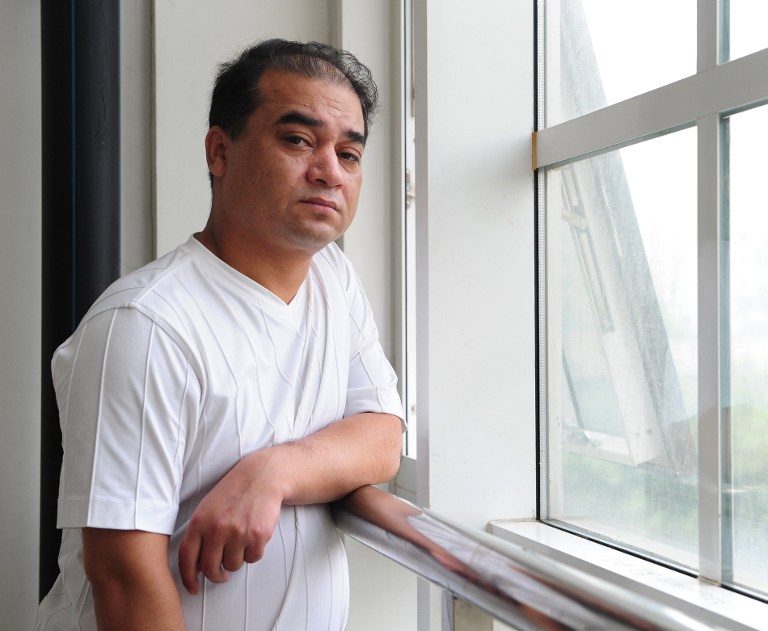SUMMARY
This is AI generated summarization, which may have errors. For context, always refer to the full article.

BEIJING, China – Seven students of a prominent scholar from China’s Uighur minority have been tried in secret for separatism, a lawyer said Wednesday, November 26, after their professor lost an appeal against a life sentence for the same offense.
Ilham Tohti’s ex-students face up to 15 years in prison if found guilty, in a move seen as part of an effort to silence criticism of government policies in the far-western Xinjiang region, home to the mostly-Muslim Uighur group.
China blames attacks and clashes in Xinjiang, which have claimed several hundred lives in the past year, on terrorists seeking independence for the region, while rights groups say official repression of Uighur religion and culture has stoked violence.
The hearings were held in two closed-door sessions in Xinjiang’s capital Urumqi on Tuesday, November 25, said Li Fangping, a lawyer for Tohti.
Six of the students are Uighurs while one is a member of China’s Yi minority, the state-run Global Times newspaper reported.
The students could face five to 15 years in prison, the newspaper said, citing Li.
The paper added they were alleged to have helped maintain Uighur Online, a bilingual website launched by Tohti.
Authorities describe Uighur Online as “a platform… to create conflicts, spread separatist thinking, incite ethnic hatred and advocate ‘Xinjiang independence'”, the Global Times reported.
But Agence France-Presse was not able to find any articles supporting independence for Xinjiang on an archived copy of the website, which authorities deleted after Tohti was detained.
Tohti, 45, has said the site was intended to encourage communication between Uighurs and China’s Han majority. While he had been an outspoken critic of China’s policies towards Uighurs, he repeatedly told reporters that he opposed independence for the region.
Xinjiang authorities last week rejected his appeal against a life sentence for “separatism” handed down in September, which had sparked outrage from international rights groups as well as the US and European Union.
‘Persecution’ of students
China in May vowed a year-long campaign against terrorism, after 39 people were reportedly killed in a suicide attack in Urumqi. Police have shot dozens of locals in other clashes over the summer.
Hundreds have been jailed and detained on terror-related offenses in the region since, with several sentenced to death.
Rights groups say that harsh police treatment of Uighurs and government campaigns against religious practices such as the wearing of veils have led to violence.
“Law enforcers also sometimes handle religious issues inappropriately, causing conflict between the government and the local people,” Li Juan, president of the Xinjiang Police Academy, told the China Daily on Wednesday.
A verdict for the students is expected at a later date, added lawyer Li, who declined to say whether he represented any of the defendants.
Officials at the Intermediate People’s Court in Urumqi did not respond to requests for comment.
Dilxat Raxit, spokesman for the exile World Uyghur Congress, said: “China uses the legal system it controls to persecute students.
“If the international community does not put pressure on China, I fear that more people will lose their freedom because they express dissenting opinions online.”
The trials come at a time when the Communist party under President Xi Jinping has launched a harsh crackdown on dissent, in which scores of activists, lawyers, academics and journalists have been jailed or detained.
The Global Times identified the 7 students as Mutellip Imin, Perhat Halmurat, Shohret Nijat, Abduqeyyum Ablimit, Atikem Rozi, Akbar Imin and Luo Yuwei.
Mutellip Imin wrote in an online post last year that police had held him without charge for 79 days, during which time he was repeatedly interrogated and forced to sign a statement denouncing Tohti. He was released but later detained again.
“I raised objections, but they threatened to send me to jail for a year or two if I did not cooperate,” he wrote. – Rappler.com
Add a comment
How does this make you feel?
There are no comments yet. Add your comment to start the conversation.